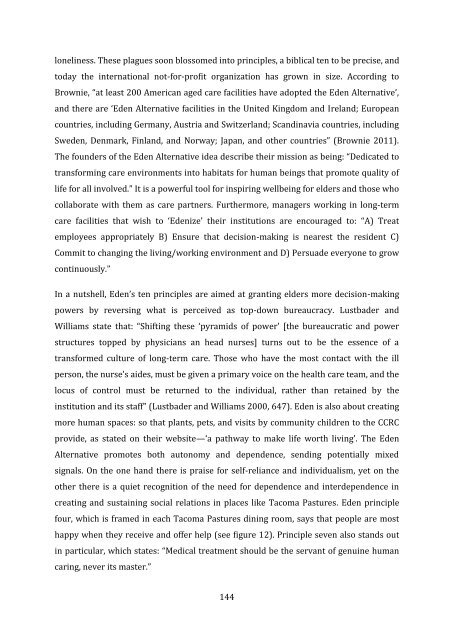Philip Y. Kao PhD thesis - Research@StAndrews:FullText
Philip Y. Kao PhD thesis - Research@StAndrews:FullText
Philip Y. Kao PhD thesis - Research@StAndrews:FullText
You also want an ePaper? Increase the reach of your titles
YUMPU automatically turns print PDFs into web optimized ePapers that Google loves.
loneliness. These plagues soon blossomed into principles, a biblical ten to be precise, and<br />
today the international not-for-profit organization has grown in size. According to<br />
Brownie, “at least 200 American aged care facilities have adopted the Eden Alternative’,<br />
and there are ‘Eden Alternative facilities in the United Kingdom and Ireland; European<br />
countries, including Germany, Austria and Switzerland; Scandinavia countries, including<br />
Sweden, Denmark, Finland, and Norway; Japan, and other countries” (Brownie 2011).<br />
The founders of the Eden Alternative idea describe their mission as being: “Dedicated to<br />
transforming care environments into habitats for human beings that promote quality of<br />
life for all involved.” It is a powerful tool for inspiring wellbeing for elders and those who<br />
collaborate with them as care partners. Furthermore, managers working in long-term<br />
care facilities that wish to ‘Edenize’ their institutions are encouraged to: “A) Treat<br />
employees appropriately B) Ensure that decision-making is nearest the resident C)<br />
Commit to changing the living/working environment and D) Persuade everyone to grow<br />
continuously.”<br />
In a nutshell, Eden’s ten principles are aimed at granting elders more decision-making<br />
powers by reversing what is perceived as top-down bureaucracy. Lustbader and<br />
Williams state that: “Shifting these ‘pyramids of power’ [the bureaucratic and power<br />
structures topped by physicians an head nurses] turns out to be the essence of a<br />
transformed culture of long-term care. Those who have the most contact with the ill<br />
person, the nurse’s aides, must be given a primary voice on the health care team, and the<br />
locus of control must be returned to the individual, rather than retained by the<br />
institution and its staff” (Lustbader and Williams 2000, 647). Eden is also about creating<br />
more human spaces: so that plants, pets, and visits by community children to the CCRC<br />
provide, as stated on their website—‘a pathway to make life worth living’. The Eden<br />
Alternative promotes both autonomy and dependence, sending potentially mixed<br />
signals. On the one hand there is praise for self-reliance and individualism, yet on the<br />
other there is a quiet recognition of the need for dependence and interdependence in<br />
creating and sustaining social relations in places like Tacoma Pastures. Eden principle<br />
four, which is framed in each Tacoma Pastures dining room, says that people are most<br />
happy when they receive and offer help (see figure 12). Principle seven also stands out<br />
in particular, which states: “Medical treatment should be the servant of genuine human<br />
caring, never its master.”<br />
144
















